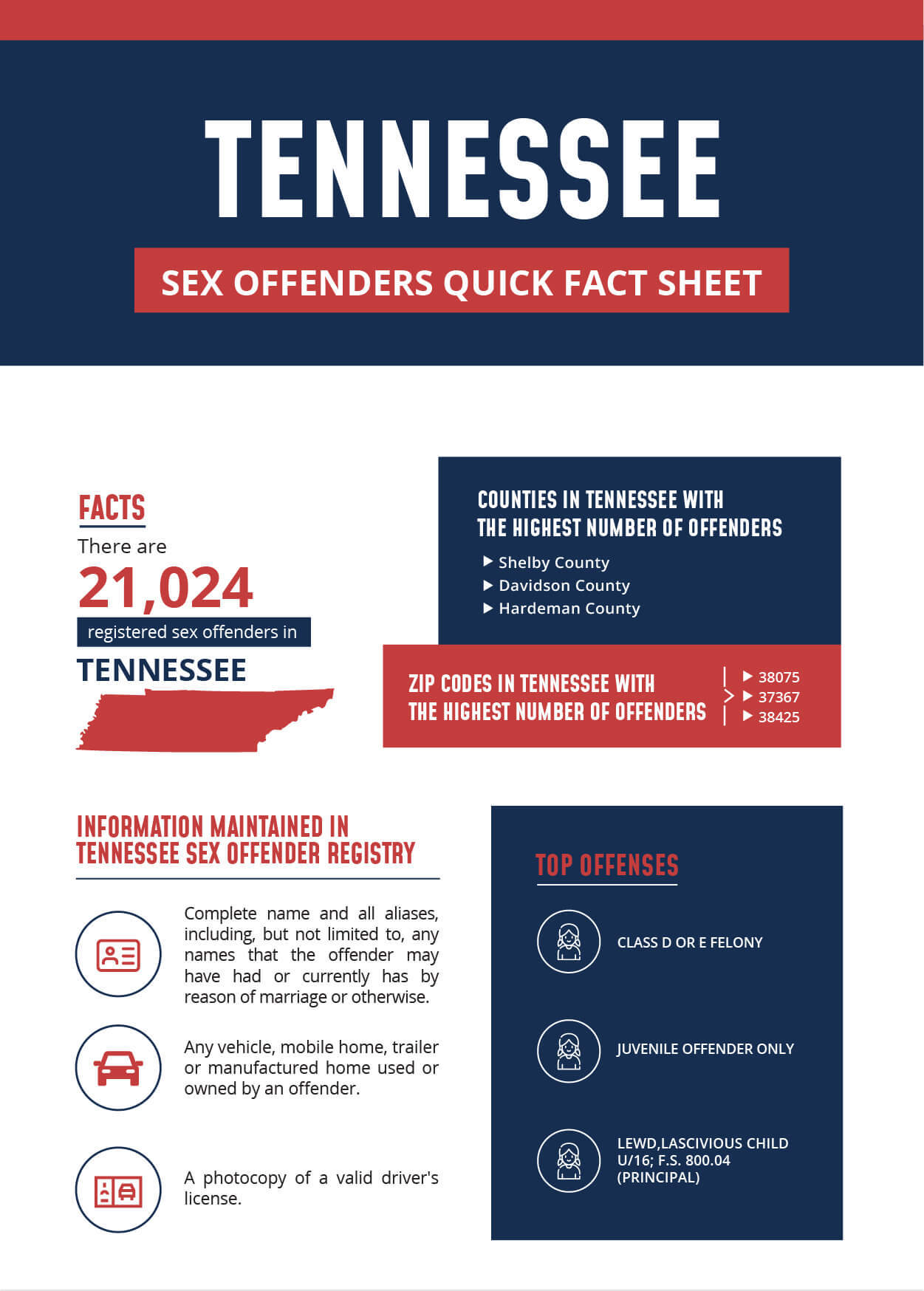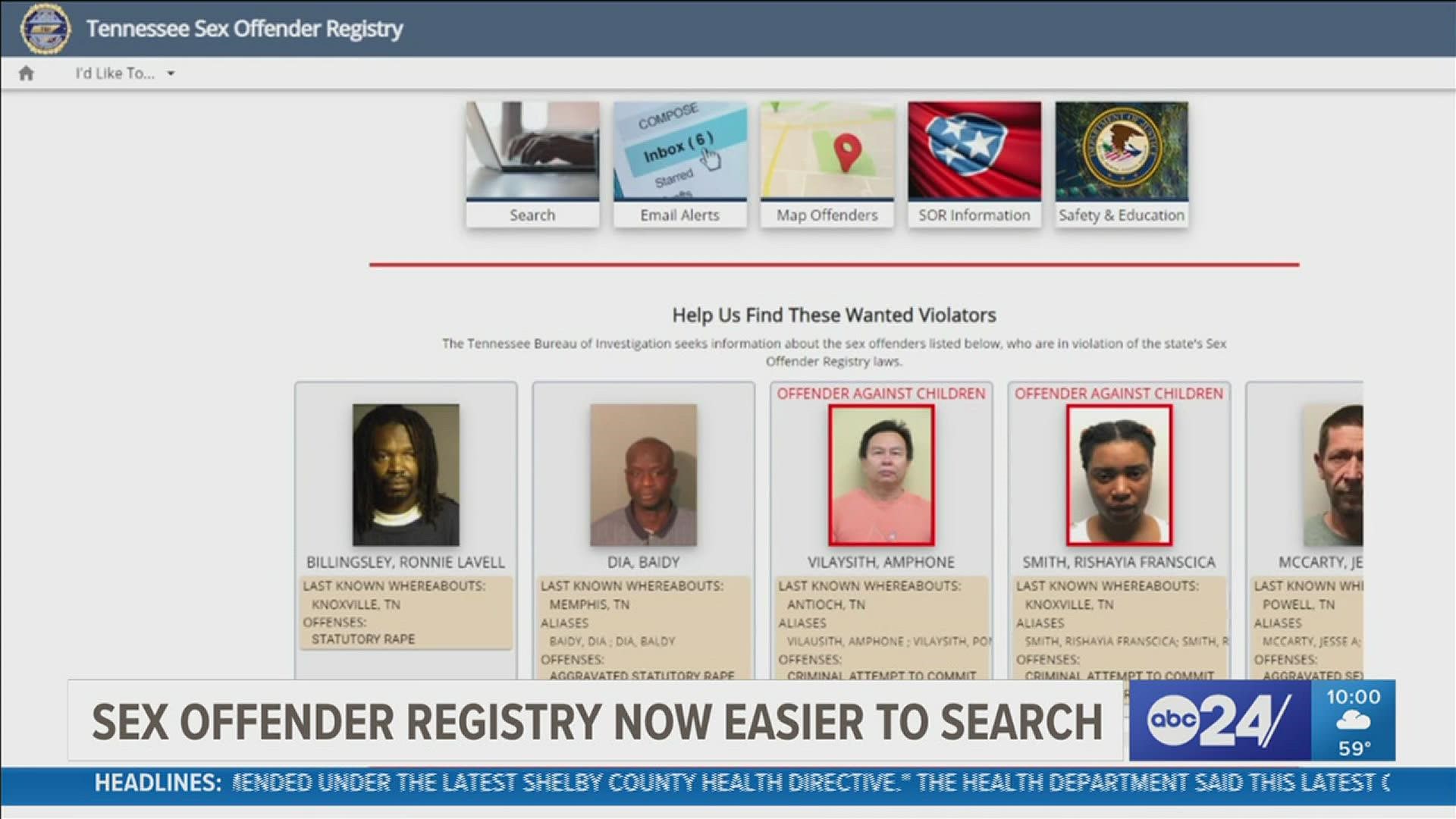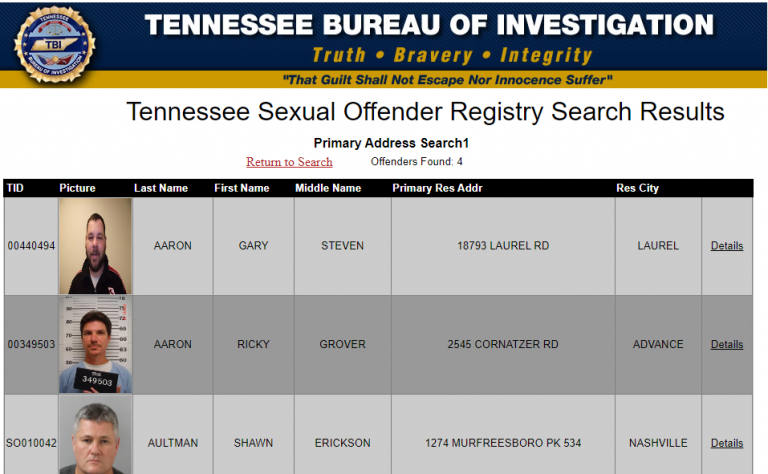Navigating the Tennessee Sex Offender Registry: A Guide to Understanding and Utilizing the Tool
Related Articles: Navigating the Tennessee Sex Offender Registry: A Guide to Understanding and Utilizing the Tool
Introduction
With enthusiasm, let’s navigate through the intriguing topic related to Navigating the Tennessee Sex Offender Registry: A Guide to Understanding and Utilizing the Tool. Let’s weave interesting information and offer fresh perspectives to the readers.
Table of Content
Navigating the Tennessee Sex Offender Registry: A Guide to Understanding and Utilizing the Tool

The Tennessee Sex Offender Registry (TSOR) is a valuable tool for community safety and transparency. It serves as a public resource, providing access to information about individuals convicted of sex offenses in the state. This article aims to demystify the TSOR, exploring its purpose, features, and limitations, while emphasizing its importance in enhancing public safety and awareness.
The Purpose and Structure of the Tennessee Sex Offender Registry:
The TSOR is mandated by Tennessee law and managed by the Tennessee Bureau of Investigation (TBI). Its primary purpose is to:
- Inform the public: The registry provides citizens with access to information about individuals convicted of sex offenses within Tennessee, enabling them to make informed decisions regarding their safety and the well-being of their families.
- Monitor compliance: The registry serves as a mechanism to monitor the compliance of registered offenders with the conditions of their parole or probation, ensuring that they are adhering to mandated restrictions and reporting requirements.
- Promote public safety: By providing transparency and information, the registry aims to deter future offenses and protect vulnerable populations from potential harm.
The TSOR database contains information about registered offenders, including:
- Personal details: Name, date of birth, race, gender, height, weight, eye color, hair color, and address.
- Offense details: The nature of the offense, the date of the offense, the county where the offense occurred, and the court that adjudicated the case.
- Registration status: Whether the offender is compliant with the registration requirements, any outstanding warrants, and the offender’s risk level.
- Photographs: The registry may include a photograph of the registered offender.
Accessing Information on the Tennessee Sex Offender Registry:
The TSOR is accessible to the public via the TBI’s website. Users can search the registry by various criteria, including:
- Name: Search by the offender’s full name or a portion of their name.
- Address: Search by a specific address or a geographic area.
- Offense type: Search by the type of sex offense committed, such as rape, sexual battery, or child exploitation.
- Risk level: Search by the offender’s risk level, which is determined based on factors such as the severity of the offense and the offender’s likelihood of re-offending.
Understanding the Limitations of the Tennessee Sex Offender Registry:
While the TSOR is a valuable resource, it is important to acknowledge its limitations:
- Incomplete information: The registry may not contain information about all individuals convicted of sex offenses, particularly if the offense occurred outside of Tennessee.
- Privacy concerns: The registry raises privacy concerns for registered offenders, who may face stigma and discrimination as a result of their public status.
- Dynamic nature: The information on the registry is constantly changing as offenders move, change their registration status, or have their offenses expunged.
- Reliability of data: The accuracy and completeness of the data rely on the cooperation of registered offenders, who may not always provide accurate information.
The Importance of Responsible Use of the Tennessee Sex Offender Registry:
The TSOR is a powerful tool for community safety, but its use should be responsible and ethical. It is crucial to avoid:
- Using the registry for harassment or intimidation: The registry should not be used to harass or intimidate registered offenders or their families.
- Drawing false conclusions: The registry should not be used to make assumptions or judgments about an individual based solely on their registration status.
- Disseminating information without verification: The registry should not be used to spread misinformation or rumors about registered offenders.
FAQs Regarding the Tennessee Sex Offender Registry:
Q: Who is required to register as a sex offender in Tennessee?
A: Individuals convicted of certain sex offenses, including rape, sexual battery, child molestation, and child pornography, are required to register as sex offenders in Tennessee. The specific offenses that require registration are outlined in Tennessee law.
Q: How long does an individual remain on the Tennessee Sex Offender Registry?
A: The length of time an individual remains on the registry depends on the severity of the offense and the offender’s risk level. Some offenders may be required to register for life, while others may be removed from the registry after a specific period of time.
Q: Can an individual be removed from the Tennessee Sex Offender Registry?
A: In some cases, an individual may be eligible for removal from the registry after a certain period of time or if they meet specific criteria. However, the process for removal can be complex and time-consuming.
Q: What are the consequences of failing to register as a sex offender in Tennessee?
A: Failing to register as a sex offender in Tennessee is a serious crime, punishable by imprisonment and fines.
Q: How can I get help if I am concerned about a registered sex offender in my community?
A: If you are concerned about a registered sex offender in your community, you should contact your local law enforcement agency or the TBI. They can provide you with information and resources to help you stay safe.
Tips for Using the Tennessee Sex Offender Registry:
- Use the registry to stay informed: The registry can be a valuable tool for staying informed about registered sex offenders in your community.
- Be cautious about information from social media: Information about registered sex offenders may be shared on social media, but it is important to verify the accuracy of this information before sharing it.
- Report any suspicious activity: If you see any suspicious activity related to a registered sex offender, report it to your local law enforcement agency.
- Educate yourself about sex offender laws: Familiarize yourself with Tennessee’s sex offender laws and regulations.
Conclusion:
The Tennessee Sex Offender Registry is a complex tool with both benefits and limitations. It is essential to use the registry responsibly and ethically, recognizing its potential to enhance public safety while respecting the privacy and rights of registered offenders. By understanding the purpose, features, and limitations of the TSOR, individuals can make informed decisions about their safety and contribute to a safer community for all.






Closure
Thus, we hope this article has provided valuable insights into Navigating the Tennessee Sex Offender Registry: A Guide to Understanding and Utilizing the Tool. We hope you find this article informative and beneficial. See you in our next article!